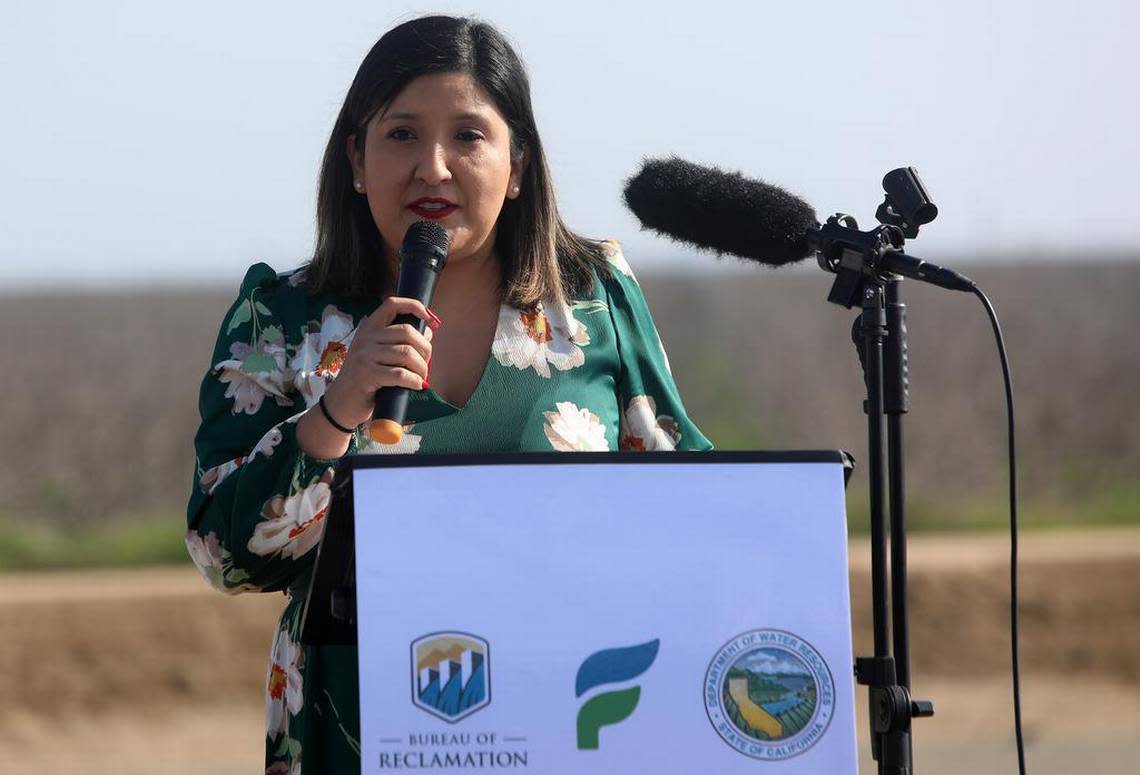Can California help drought-stricken farmworkers following Gavin Newsom’s recent veto?
A Central Valley lawmaker says she’s committed to supporting farmworkers who risk losing income during the drought – but state and labor groups are at odds on the best approach.
State Sen. Melissa Hurtado, a Democrat who represents California’s 14th district, said that while California has invested millions of dollars into climate change response, it has fallen short investing in “the people that are hardest hit and first hit by climate change.”
Hurtado is running for re-election to represent California’s 16th district due to changes in redistricting.
“This is a climate change issue,” she said in a phone interview with The Bee on Wednesday. Farmworkers “are part of our food system,” and “need to be part of our funding package as well.”
Earlier this year, Hurtado introduced SB 1066, a bill that would have allocated $20 million to create the California Farmworkers Drought Resilience Pilot Project, a state-funded project to provide monthly cash payments of $1,000 for three years to eligible farmworkers.
Last week, Gov. Gavin Newsom vetoed the proposed legislation.
The proposal came after news that California’s agricultural industry lost over $1 billion in revenue due to the drought.
A February report by researchers at UC Merced found that Central Valley farmers had to take about 385,000 acres of land out of production due to the drought and irrigation cutbacks. They also found that the agriculture industry lost over 8,000 jobs in 2021 alone due to the drought.
In his Sept. 29 veto message, Newsom said that funds were not included in the budget for this program and that the state needs to prioritize existing obligations and priorities such as education, health care, public safety and safety-net programs. He also said that his administration has already set aside $35 million in the 2021-22 state budget to fund a guaranteed income pilot program over five years.
In an email statement to The Bee, a spokesperson for the California Department of Social Services said they’re currently reviewing applications for the guaranteed income program and anticipates making award announcements later this year.

Hurtado pledged to keep fighting to support agriculture workers and plans to reintroduce the legislation, perhaps expanding it to more agricultural employees.
“Where is the support for farmworkers?” she said. “I feel heartbroken because I’m not really seeing it.”
Hard to pinpoint how many farmworker jobs are impacted by drought
Hurtado said one challenge in helping farmworkers experiencing income loss during the drought is understanding the scope of the drought’s impact on them.
“I don’t think we’re going to have a true reflective picture of what (farmworker’s unemployment) actually looks like,” said Hurtado, “because we don’t even know how many farmworkers are in the state of California.”
There are an estimated 420,000 agricultural workers in California, Josué Medellín-Azuara, associate director of the UC Agricultural Issues Center and one of the authors of the report, said in an Aug. 29 interview with The Bee/Fresnoland and KVPR.
But Medellín-Azuara agrees with Hurtado.
Due to imperfect data and a large number of undocumented workers in the industry, accurate data is hard to come by, he said. “It’s been known for a while that for every social security number, there’s about two people” using that same number.
As a result, “it’s hard to tell what’s happening on the ground” in terms of the drought’s full impact on employment in agriculture, Medellín-Azuara said.
Would the proposed law have been a ‘subsidy’ for agricultural industry?
Not everyone agrees Hurtado’s proposed legislation would have helped farmworkers during a drought.
Edward Flores, a professor of sociology and faculty director of the UC Merced Community and Labor Center, said the legislation, had it passed, would have been a “subsidy for the agricultural industry.”
“What it did was require workers to be tethered to the workplace in order to access universal basic income,” he said in a Sept. 20 interview with The Bee/Fresnoland and KVPR on how the drought is impacting farmworkers.
Some agricultural industry groups, such as the California Fresh Fruit Association, supported the proposed bill.
In a phone interview with The Bee in April, Ian LeMay, the association’s president, said he supported the bill because it would have helped farmworkers remain in their communities and be available for employment when the drought eases up or when “an increased allocation of water is made to the growers in the central San Joaquin Valley.”
Flores said the bill didn’t have any language that clearly targeted communities experiencing drought.
Instead, he said, “the language in that bill was very clear about the funds providing basic income to those people that remain tethered to the agricultural workforce,” he said.
In response, Hurtado said the financial support “would go directly to the employee. Why would anybody be opposed to that?”
Flores said programs such as access to an expanded safety net or paid workforce development training for new skills and jobs would be better alternatives to help farmworkers who experience income loss as a result of the drought.
Hurtado said she supports different types of programs to help farmworkers and that she had, in the past, introduced legislation that focuses on transitioning farmworkers into other types of jobs, but the bill failed to garner enough support.
Whatever the right approach, Hurtado said supporting California farmworkers during the drought and climate change is urgent.
“The problem is that they need the support now,” she said. “Actually, they needed it yesterday, and we’re failing them again.”
